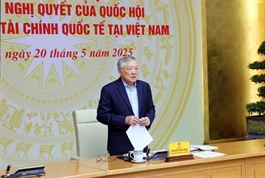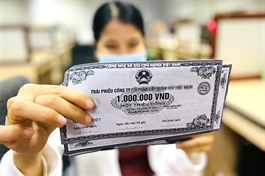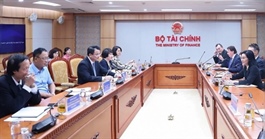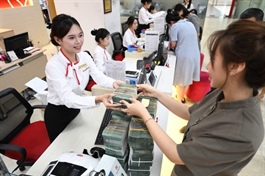CIT law amendments boast exceptional sci-tech incentives
CIT law amendments boast exceptional sci-tech incentives
Vietnam is drafting major changes to its corporate income tax legislation, offering unprecedented incentives in sci-tech and digital transformation.
The draft amended Law on Corporate Income Tax was submitted to the National Assembly (NA) in early May for discussion at its ongoing ninth session.
Minister of Finance Nguyen Van Thang highlighted that the draft amendments feature groundbreaking incentives for science, technology, innovation, and digital transformation, with a proposal to grant the government flexibility to tailor these policies to practical developments.
Presenting the explanatory report, Phan Van Mai, Chairman of the NA’s Economic and Financial Committee, stated that to institutionalise sci-tech and innovative transformation, the government has proposed allowing sponsoring enterprises to deduct their contributions for technology development, innovation, and digital transformation from taxable income.
At the same time, recipient enterprises would be exempt from paying tax on this sponsorship income, regardless of whether it originates from independent businesses or those with affiliated relationships.
However, many expressed concern that spending in these fields is often substantial and wide-ranging, while there remains a lack of detailed legal guidance, and market-based valuation in such areas is currently unfeasible. As a result, the proposed regulation could carry risks of abuse through profit shifting, transfer pricing, and tax avoidance, particularly when the sponsoring and recipient enterprises are related parties.
Given that these provisions have not yet undergone rigorous impact assessments, it was suggested that tax exemptions for sponsorships between affiliated entities should be temporarily excluded to prevent potential abuse.
While supporting the government’s proposal, the National Assembly Standing Committee (NASC) also cautioned against the risk of policy misuse. Subsequent discussions revealed that many deputies expressed strong interest in tax incentives for technology development, innovation, and digital transformation, and there was broad agreement with the government’s proposals.
Acknowledging concerns from oversight agencies about potential for tax evasion via affiliated transactions, deputy Le Thu Ha representing the northern province of Lao Cai warned that restricting exemptions only to non-affiliated sponsorships may be counterproductive.
“Most investments in research and development today come from multinational corporations and large private groups operating through affiliate models. If internal donations are excluded, we risk missing out on the creative capital flow and weakening the momentum for technology dissemination in the economy. International experience shows that many countries continue to apply incentives for internal donations, but with effective control mechanisms,” said Ha.
Based on this analysis, she proposed that the draft amended CIT law design a smart risk control mechanism, implement stringent post-audits, ensure compliance, and introduce clear and feasible criteria. Ha also suggested encouraging independent auditing and enhancing data sharing between tax authorities and specialised oversight agencies.
In response to these concerns, Minister Thang stated that the draft had proposed additional groundbreaking incentives for science, technology, innovation, and digital transformation compared to existing regulations.
Specifically, the draft includes provisions allowing businesses to deduct expenses for research, technology development, innovation, and digital transformation when calculating CIT. It also proposes granting the government the authority to determine the maximum deductible amounts and conditions for such expenditures, providing a legal basis for adjustments in line with practical circumstances.
“Experience in some countries shows that such regulations are not fixed but entrusted to the government for flexibility. To ensure adaptability and practicality, we also propose continuing to delegate this responsibility to the government,” the minister added.
Another issue raised in the draft amended CIT law concerns tax incentives for public service enterprises. Under the current law, public service units that are able to determine their revenues, costs, and incomes are required to pay CIT like private businesses. In cases where they can determine revenue but not expenses or income, tax is calculated as a percentage of revenue.
Contributing to the discussion, deputy Hoang Van Cuong representing Hanoi noted that public hospitals and educational institutions operating autonomously without state budget support are still subject to CIT on surplus income, which cannot then be reinvested in infrastructure. Meanwhile, private institutions enjoy tax exemptions. This discrepancy, he argued, is unreasonable.
Deputy Nguyen Lan Hieu, representing the south-central province of Binh Dinh, added that any activity involving the word “service” is generally taxed. “In the healthcare system, revenues from public service provision are taxable. As a result, most revenue generated by self-financed public hospitals is currently subject to taxation,” he said.
Responding to these concerns, Minister Thang explained that many public service units simultaneously provide both state-funded services and non-state-funded services. For operations that involve business activities, such as those in healthcare and education, charging market rates and generating profits through partnerships, taxation is appropriate.
However, for services provided with state funding where the service prices do not fully account for costs, the taxes on profits are not justified.
“In light of the deputies’ comments, the drafting agencies have reviewed and integrated them into the draft, while also continuing to research adjustments to ensure the draft remains aligned with practical realities and the legal rights of public service units without causing revenue loss or tax evasion,” Minister Thang assured.
NA Vice Chairman Nguyen Duc Hai emphasised that the NASC would carefully review all concerns raised by the deputies to refine the draft. According to Hai, the NASC will direct relevant bodies, including the drafting and appraisal agencies, to thoroughly review all contributions, improve the explanatory report, and finalise the draft CIT law for submission to the NA.
|
New policy framework could take effect sooner During the discussion session on May 12, several National Assembly deputies argued that in the context of domestic growth being impacted by US tax policies, Vietnam must strengthen its internal drivers of development. To this end, they called for the swift introduction of new provisions aimed at boosting science and technology, in line with current resolutions on digital advancement and the private sector. It was proposed that the new rules come into force from the beginning of October, three months earlier than the current proposed start date of January 2026. Responding to the suggestion, Minister of Finance Nguyen Van Thang declared that the drafting committee would make every effort to bring the amended CIT law into effect as early as proposed. |
- 10:16 21/05/2025




























